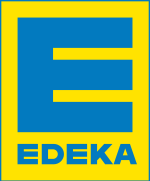Edeka
The Edeka Group is the largest German supermarket corporation as of 2017, holding a market share of 20.3%.[1] Founded in 1898, it consists today of several cooperatives of independent supermarkets all operating under the umbrella organisation Edeka Zentrale AG & Co KG, with headquarters in Hamburg. There are approximately 4,100 stores with the Edeka nameplate that range from small corner stores to hypermarkets. On November 16, 2007, Edeka reached an agreement with Tengelmann to purchase a 70% majority stake in Tengelmann's Plus discounter store division, which was then merged into Edeka's Netto brand, with some 4,200 stores by 2018.[2] Under all brands the company operated a total of 13,646 stores at the end of 2017.[1]
 | |
| Private | |
| ISIN | DE000A0EAL21 |
| Industry | Retail |
| Founded | 1898 in Berlin, Germany |
| Headquarters | , |
Area served | Europe |
Key people | Markus Mosa Gert Schambach Dr. Reinhard Schütte |
| Services | Cash & Carry/Warehouse Club, Convenience/Forecourt Store, Discount Store, Electronics Specialty, Home Improvement, Hypermarket/Supercenter/Superstore, Other Specialty, Supermarket |
| Revenue | US$ 59.2 billion (2017) |
Number of employees | 369,300 |
| Website | edeka.de |
History
The cooperative was founded in 1898 as the E.d.K. (Einkaufsgenossenschaft der Kolonialwarenhändler im Halleschen Torbezirk zu Berlin, "Purchasing Cooperative of Colonial Goods Retailers in the Hallesches Tor district of Berlin"). In 1911, it was renamed as Edeka - a phonetic expansion of the previous abbreviation. The Edekabank was founded in 1914 and, from 1923, central billing was introduced.
After the Second World War, the reconstruction of the store network was led from the new Hamburg central offices. In 1972, the cooperatives changed structure and formed twelve regional companies, the umbrella corporation and the Edekabank converting from a cooperative to a public limited company.
In 2001, the Edeka own brand "Gut & Günstig" was founded.
Christmas 2015 the company attracted worldwide attention with the highly sentimental TV commercial #heimkommen, about a lonely grandfather desperate to reunite with his family for Christmas. Intended only for the German public, it reached over 43 million views worldwide on YouTube by December 18, 2015, and became a cultural phenomenon, with nearly 62 million views by June 2019.[3] [4]
Brand names
Operational names of these stores include:
- Edeka nah und gut ("close and good") - stores up to 400 m2 (4300 sq ft), mostly found in smaller municipalities
- Edeka aktiv markt ("active mart") - mostly privately run supermarkets between 400 m2 and 800 m2 (4300 and 8600 sq ft), mostly located in outlying neighborhoods and villages
- Edeka neukauf - privately or centrally managed stores between 800 m2 and 2000 m2 (8600 and 21,500 sq ft)
- Edeka center (E-Center) - hypermarkets between 2000 m2 and 5000 m2 (21,500 and 54,000 sq ft)
- Edeka C&C Großmarkt (Mios) (cash & carry)
- Edeka Großverbraucherservice (for commercial customers)
- Edeka NP-Markt
Stores not operating under the Edeka brand, but belonging to the group nonetheless:
- SPAR (only in Germany)
- aktiv discount - often rebranded E-Center stores, mainly in northern Germany
- Netto Marken-Discount - discount stores
- Marktkauf - hypermarkets, mainly in the west of Germany
It also has holdings in Denmark.
Edeka also operates a number of companies providing related services, for example the Edekabank.
Controversies
A 2019 Mother's Day online commercial[5] showing a series of clips of fathers interacting with their children incompetently, followed by shots of caring mothers with their children, and the punchline "Mum, thank you for not being dad," was criticized widely for its clichéd portrayal of the roles of mothers and fathers.[6]
Stevie Schmiedel, a gender researcher and founder of the German branch of the feminist lobby organization "Pinkstinks," which campaigns against sexism in advertising, commented: "Maybe the advertisers really thought they were doing something good for women on Mother's Day. But everything went wrong. The commercial is pseudo-progressive. It divides and intensifies the fight between the sexes. A poisoned Mother's Day present."[6]
Edeka was officially reprimanded by the Deutscher Werberat, the German advertising standards regulator, for breaching advertising standards by "reinforcing 1950's gender stereotypes," and while "ironic exaggeration is permissible, gender stereotyping is not." The authority also cited the large number of complaints and the debate about the commercial on social media, saying this showed that viewers either did not understand that it was meant to be ironical, or that they felt the ironic use of stereotypes was not acceptable to them.[7]
References
- "Ranking: Top 30 Lebensmittelhandel Deutschland 2018". lebensmittelzeitung.net. Retrieved 12 October 2018.
- "Tengelmann entscheidet sich für EDEKA" Archived 2007-12-03 at the Wayback Machine (German)
- "EDEKA Weihnachtsclip - #heimkommen - YouTube" [EDEKA Christmas video - "Coming home"]. EDEKA. November 28, 2015. Retrieved June 13, 2019.
- "Grandfather goes to extremes to bring family home for Christmas in German ad". ABC7 Los Angeles. December 2, 2015. Retrieved June 13, 2019.
- "„Wir sagen Danke."" ["We say thank you."]. EDEKA. May 5, 2019. Retrieved June 19, 2019.
- Walsh, Alistair (May 9, 2019). "Mother's Day fail: German supermarket Edeka slammed for sexist ad". Deutsche Welle. Retrieved June 19, 2019.
- "EDEKA verletzt Branchenstandards | Werberat rügt Muttertagsspot" [EDEKA violates advertising standards | Werberat advertising standards authority castigates Mother's Day online commercial.]. Deutscher Werberat (in German). May 24, 2019. Retrieved June 19, 2019.